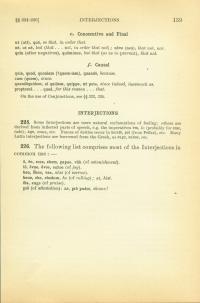225. Some Interjections are mere natural exclamations of feeling; others are derived from inflected parts of speech, e.g. the imperatives em [lo (probably for eme take)], age (come), etc. Names of deities occur in herclē, pol (from Pollux), etc. Many Latin interjections are borrowed from the Greek, as euge, euhoe, etc.
226.The following list comprises most of the Interjections in common use.
ō, ēn, ecce, ehem, papae, vāh
[of astonishment]
iō, ēvae, ēvoe, euhoe
[of joy]
heu, ē̆heu, vae
alas [of sorrow]
heus, eho, ehodum
ho [of calling]
st
hist, psst
êia, euge
[of praise]
prō
[of attestation: prō pudor shame!]
XML Files

